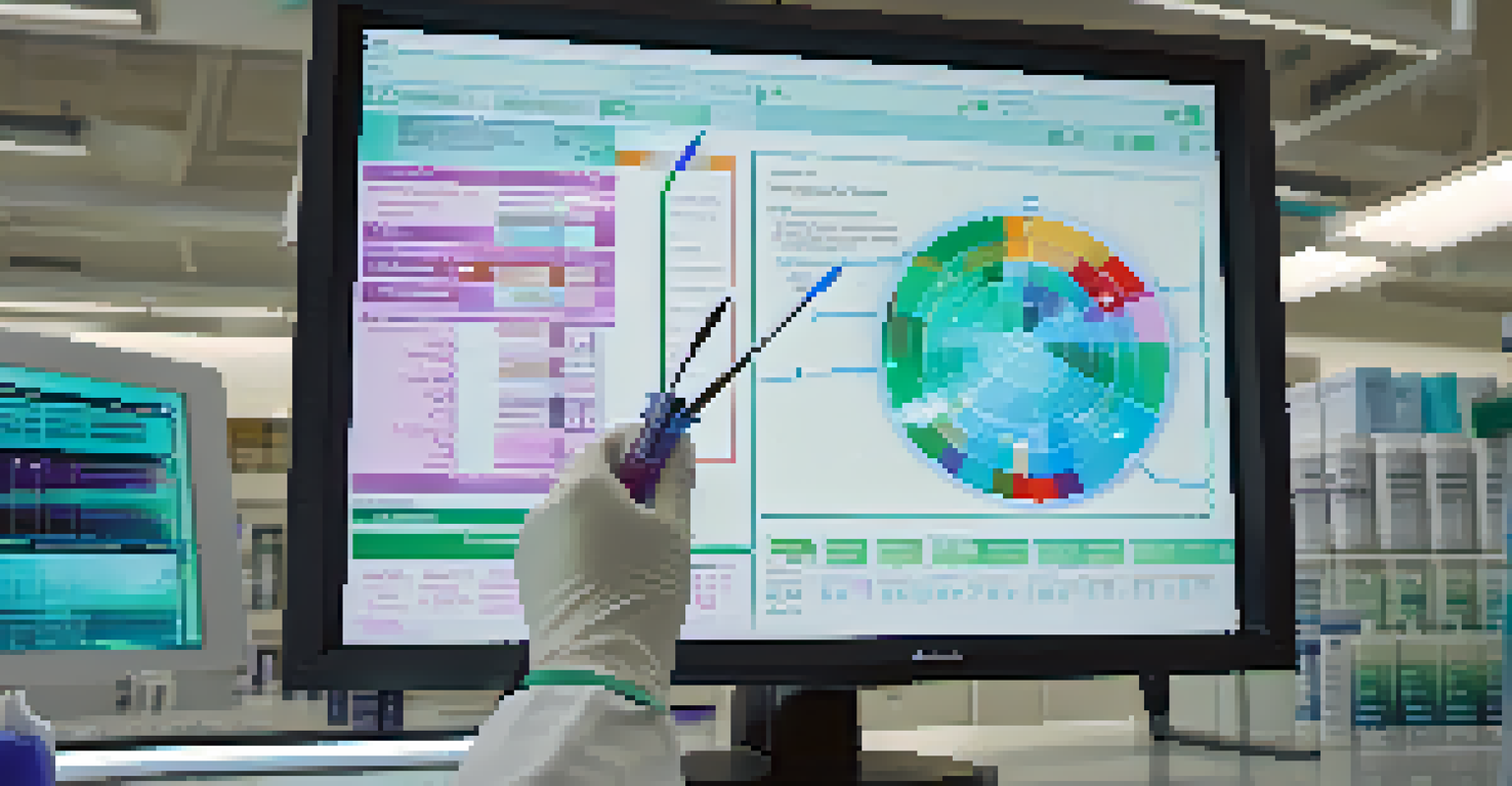The Role of Pharmacogenomics in Managing Chronic Diseases

What is Pharmacogenomics and Why It Matters?
Pharmacogenomics is the study of how our genes affect our response to medications. By understanding these genetic variations, healthcare providers can tailor treatments to individuals, enhancing efficacy and minimizing adverse effects. This approach is particularly crucial in managing chronic diseases, where patients often take multiple medications over long periods.
Your genes are not your fate. They are a guide to your health and can help you know which medications will work best for you.
Imagine if your doctor could prescribe a medication that works best for you based on your DNA. That's the promise of pharmacogenomics. It moves us away from the one-size-fits-all model of treatment, which can sometimes lead to ineffective or harmful outcomes. Instead, it opens a door to more personalized healthcare.
As chronic diseases like diabetes, hypertension, and heart disease become increasingly prevalent, integrating pharmacogenomics into treatment plans is essential. It not only improves patient outcomes but also helps in reducing healthcare costs by preventing trial-and-error prescribing.
The Connection Between Genetics and Chronic Diseases
Genetic factors play a significant role in the development and progression of chronic diseases. Certain genes can predispose individuals to conditions like diabetes or cardiovascular disease, influencing how their bodies respond to medications. This genetic insight is invaluable for crafting effective treatment strategies tailored to each patient's unique genetic makeup.

For instance, some patients may metabolize drugs quickly or slowly depending on their genetic profile. This can lead to under-treatment if the dose is too low or serious side effects if it's too high. By understanding these genetic differences, healthcare providers can adjust dosages accordingly, ensuring that patients receive the most effective treatment.
Personalized Medicine Through Genetics
Pharmacogenomics enables healthcare providers to tailor medication treatments based on individual genetic profiles, enhancing efficacy and minimizing side effects.
This connection emphasizes the importance of genetic testing in chronic disease management. It allows for a proactive approach, where treatments can be adapted based on genetic predispositions rather than waiting for a patient to experience adverse effects.
How Pharmacogenomics Enhances Treatment Outcomes
Pharmacogenomics can significantly enhance treatment outcomes by ensuring that patients receive medications that are most likely to work for them. For example, in cancer treatment, genetic testing can identify which therapies are effective based on the tumor's genetic profile. This targeted approach minimizes trial and error, reducing the time patients spend on ineffective treatments.
Pharmacogenomics is a key to unlocking personalized medicine, allowing us to tailor treatments based on an individual’s genetic makeup.
Additionally, this precision medicine strategy can lead to fewer side effects. When medications are matched to the individual's genetic makeup, the likelihood of adverse reactions diminishes. Health professionals can provide a more confident approach, knowing that the chosen medication aligns with the patient's genetic responses.
Ultimately, the integration of pharmacogenomics into chronic disease management empowers patients with better health outcomes. It fosters a collaborative relationship between patients and healthcare providers, where informed decisions lead to effective and safe treatment plans.
Challenges in Implementing Pharmacogenomics
Despite its potential, the implementation of pharmacogenomics in clinical practice faces several challenges. One major hurdle is the need for comprehensive genetic testing, which can be expensive and not always covered by insurance. This financial barrier can limit access for many patients, particularly those with chronic illnesses who may already be facing high medical costs.
Moreover, not all healthcare providers are equipped with the knowledge or resources to interpret genetic test results. There is a risk of misinterpretation, which could lead to inappropriate treatment decisions. Ongoing education and training for healthcare professionals are crucial to bridge this knowledge gap and ensure that pharmacogenomics is utilized effectively.
Genetic Testing for Better Outcomes
Genetic testing plays a crucial role in chronic disease management, allowing for proactive treatment adjustments that align with patients' unique genetic makeups.
Lastly, the ethical considerations surrounding genetic testing must be addressed. Patients need to be informed about the implications of genetic information, including privacy concerns and potential discrimination. Establishing guidelines and standards for ethical practice is essential as we navigate the evolving landscape of pharmacogenomics.
The Role of Genetic Testing in Chronic Disease Management
Genetic testing is a cornerstone of pharmacogenomics, allowing healthcare providers to understand how a patient's genetics will influence their response to medications. For example, tests can identify variations in genes that affect drug metabolism, which is particularly important for patients with chronic diseases who may be on multiple medications. This knowledge helps in crafting personalized treatment plans that maximize benefits while minimizing risks.
Patients undergoing genetic testing for chronic diseases often report feeling more involved in their healthcare decisions. They gain insights into the underlying factors that may affect their treatment, fostering a sense of empowerment. This involvement can lead to better adherence to treatment plans, as patients are more likely to follow recommendations that are tailored to their unique genetic profiles.
As more healthcare providers adopt genetic testing, we can expect to see a shift towards a more personalized approach in chronic disease management. This evolution reflects a broader trend in medicine where understanding the individual—rather than treating the disease in isolation—becomes the priority.
Future Directions of Pharmacogenomics in Healthcare
The future of pharmacogenomics in managing chronic diseases looks promising, with ongoing research and advancements in technology paving the way for more personalized medicine. As our understanding of genetics continues to evolve, we can expect to see an increase in the availability of genetic tests that are both affordable and accessible for patients. This democratization of genetic testing will help ensure that more individuals can benefit from personalized treatment plans.
Additionally, the integration of pharmacogenomics into electronic health records (EHRs) is a significant step forward. By incorporating genetic information into EHRs, healthcare providers can make more informed prescribing decisions at the point of care. This seamless integration will help streamline the process and ensure that pharmacogenomics becomes a standard part of chronic disease management.
Challenges in Pharmacogenomics Adoption
Despite its potential, implementing pharmacogenomics faces hurdles such as high costs of genetic testing and the need for healthcare provider education on interpreting results.
As we move forward, collaboration between researchers, healthcare providers, and policymakers will be essential. By working together, we can overcome existing challenges, ensuring that pharmacogenomics becomes a vital tool in improving health outcomes for patients with chronic diseases.
Conclusion: The Promise of Pharmacogenomics
In conclusion, pharmacogenomics represents a significant leap forward in the management of chronic diseases. By understanding the genetic factors that influence medication response, healthcare providers can offer more personalized and effective treatment options. This not only enhances patient outcomes but also fosters a more engaged patient-provider relationship.
As we continue to unravel the complexities of genetics, it's clear that pharmacogenomics will play an increasingly vital role in healthcare. The potential to reduce side effects, improve adherence, and ultimately enhance the quality of life for patients is too significant to ignore.

With ongoing advancements and a commitment to education, the future of pharmacogenomics in chronic disease management is bright. Embracing this personalized approach will ensure that we are not just treating diseases, but truly caring for individuals.